How to break the transfer record - and why clubs do it
The mechanics of setting a new global mark
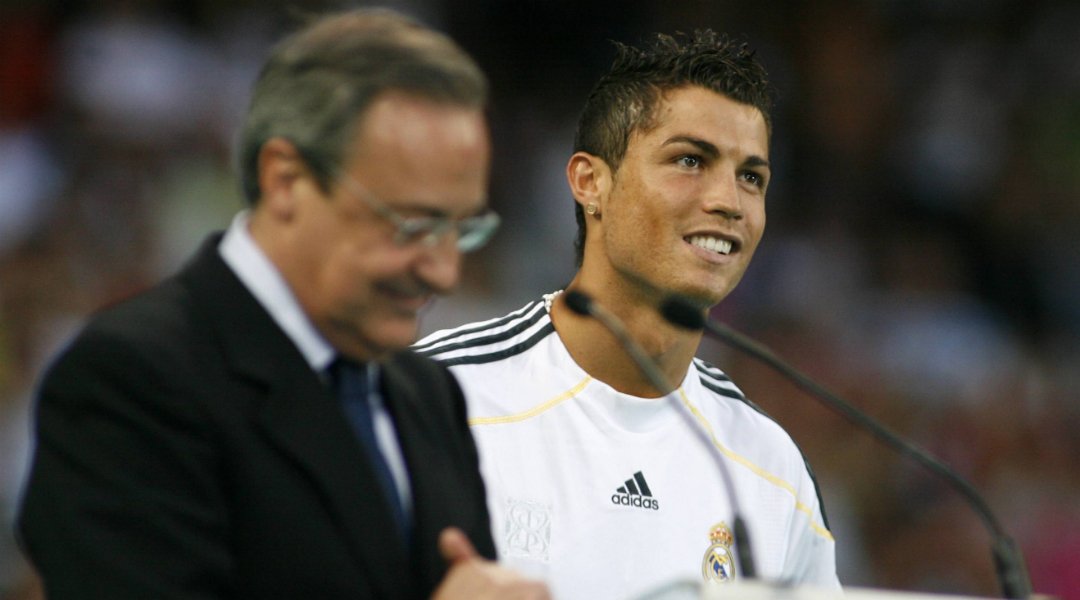
The call came on a Saturday: “OK, bring it down.” A sigh, a shrug, and back to work. Reach for the toolbox once more: what a waste of time that had been. That night at the Santiago Bernabéu workmen began dismantling the stage upon which Gareth Bale was due to be presented as a Real Madrid player. He still wasn’t there. On Sunday, after the home side had defeated Athletic Club Bilbao, the world record transfer was finally announced and the workmen were back again re-erecting it.
This time they added the finishing touches, backdrop and all; a fuzzy photo of Bale grinning in a Madrid shirt, aged 10. The photo was handed to president Florentino Pérez early in negotiations with Bale’s agent, almost like a bond. Pérez had been delighted: there was no way he would lose out on signing him now and the presentation would be special. The signing was no surprise, but the photograph would be. A secret kept under wraps. This way Pérez could talk about dreams come true, of a player born to play for Madrid, with a little more credibility.
By lunchtime on Monday, the final day of the transfer window, Bale finally trod the boards, stepping onto the stage. Nervously, the most expensive player in history spoke his first words in Spanish. Then he did a few kick-ups, not particularly good ones. He was wide-eyed, a little overwhelmed. It had been a long day already; it had started at the club’s medical centre just after half past eight, Bale told to wait a moment for the automatic doors to shut first before he walked towards them, all the better for TV cameras to see the sponsor’s name splashed across them. Now, 20,000 were at the stadium; he has played before fewer. It was, he admitted, all a bit “surreal.”
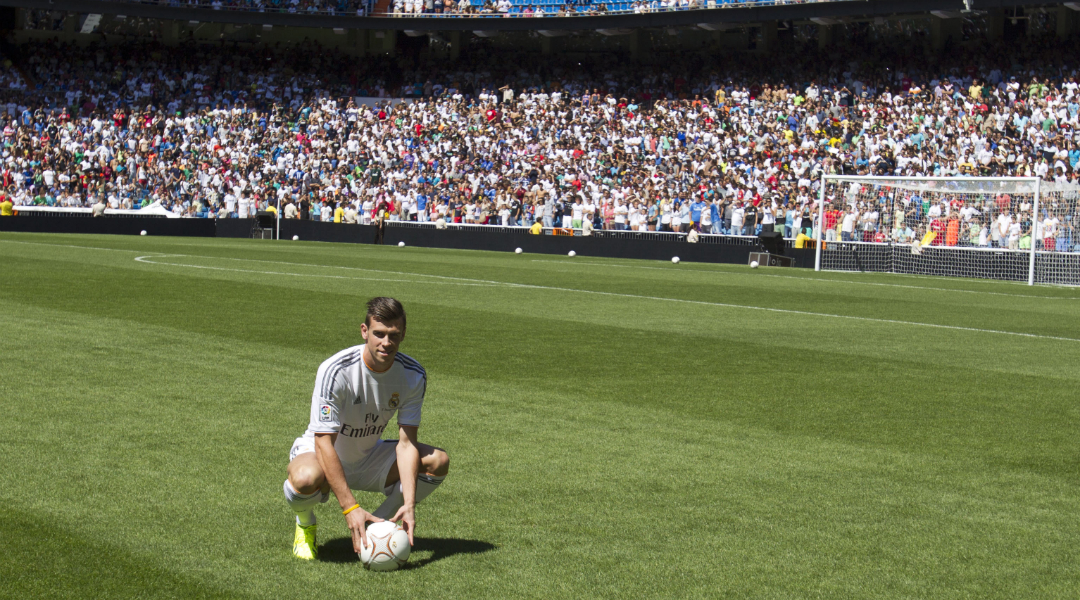
Surreal was the word. How else do you explain that a load of scaffolding became one of the stars of the summer? The stage itself had, bizarrely, become the focal point, another source of Daniel Levy’s anger, making him all the more determined to resist as long as possible. Building it, the Tottenham chairman ranted, was another sign of Madrid's arrogance: physical proof that they reckoned it was all over, when it wasn’t yet. At least, not officially. It was time for Levy to teach them a lesson: Madrid had hoped to present Bale on Friday, then Tuesday, then Wednesday... keeping them waiting was a small victory.
Get FourFourTwo Newsletter
The best features, fun and footballing quizzes, straight to your inbox every week.
And wait they did. Not just in the president’s office – where Pérez, warned of the collateral damage implicit in having a furious star feeling usurped, hopefully briefed the media that Cristiano Ronaldo had not been overtaken as the world’s most expensive player as Bale had cost £2m less – but everywhere. The stage was just the outward sign of a summer of waiting, of the impact throughout the club.
“There is a myth that everyone at the club knows everything about the signing,” says one employee at the Bernabéu. “The reality is that hardly anyone does... we read the papers saying so-and-so is already at the club and we p**s ourselves laughing: ‘Yeah, yeah, he’s here, he’s just popped out for tobacco’. But we don’t always know any better. In fact, we hardly ever do.”
Roll out the welcome mat
The final OK had arrived on Sunday afternoon. Now they knew. It was like someone had rung a bell. Action stations! Few do it quite like Madrid but when the biggest signings are made, the process is similar across the world. When Madrid signed Cristiano Ronaldo they had months to prepare, but that is unusual. Ramón Calderón, the president who reached an agreement with Manchester United, did so five months before the Portuguese actually arrived. He protests otherwise - “that [secrecy] was the agreement and we took that seriously,” he says - but the hardest part was keeping quiet, bursting with excitement to tell everyone the incredible news. This time there was even more of a hurry than normal.
Yes, they long knew he was probably coming and much had already been put into place – including the stage – but the Bale deal was only official on Sunday. On Tuesday he had to be back in Wales. The big day had to be Monday; there were 24 hours to go and the clock was ticking. “The doors don’t open themselves, you know,” laughs one employee at Real Madrid. He explains the logistics: a frantic network of calls. “In terms of the organisation and logistics it is much worse,” he says, “than a match day.”
The doors don’t open themselves, you know. In terms of the organisation and logistics, a signing is much worse than a match day”
You want thousands of fans in the stadium? You need hundreds of men on the gates. You want dignitaries in the directors’ box? You need stewardesses and security. You want the directors’ box? Even that’s not simple: you’d better check it’s not booked out first. Companies pay a fortune for corporate events; even Madrid can’t move them out at short notice. You’ve got to stop the stadium tours, too... although not for long. Soon they’re back in the press room, even before the media have finished filing their Bale stories.
You want the world’s media there? You need the press department. And once it’s public, the phone there never stops. “You’re excited,” says the press officer at one club, “but it's true that you think 'Oh God, this is going to be a nightmare.'” Another adds: “You’ve spent all summer fielding calls about the deal that you can’t even answer – ‘Is it true?’ Now, you need to put together a list: the club wants to knew which media have reacted; where the signing has made the biggest impact.”
There’s a call to the club shop: bring in the Bale shirts, get them in the window, tear open that box. “We usually find out from the media before we find out internally but we can do the shirts in minutes and point of sale in hours,” says a source at one Premier League club. Someone has to get a shirt for the new signing, too, preparing his kit and laying it out in the dressing room, ready for the cameras. Best to get a few sizes, though: one player’s presentation was delayed when he couldn’t squeeze into the shirt they had left him. Someone had to be dispatched to the club shop for another. He never did wear that first shirt.
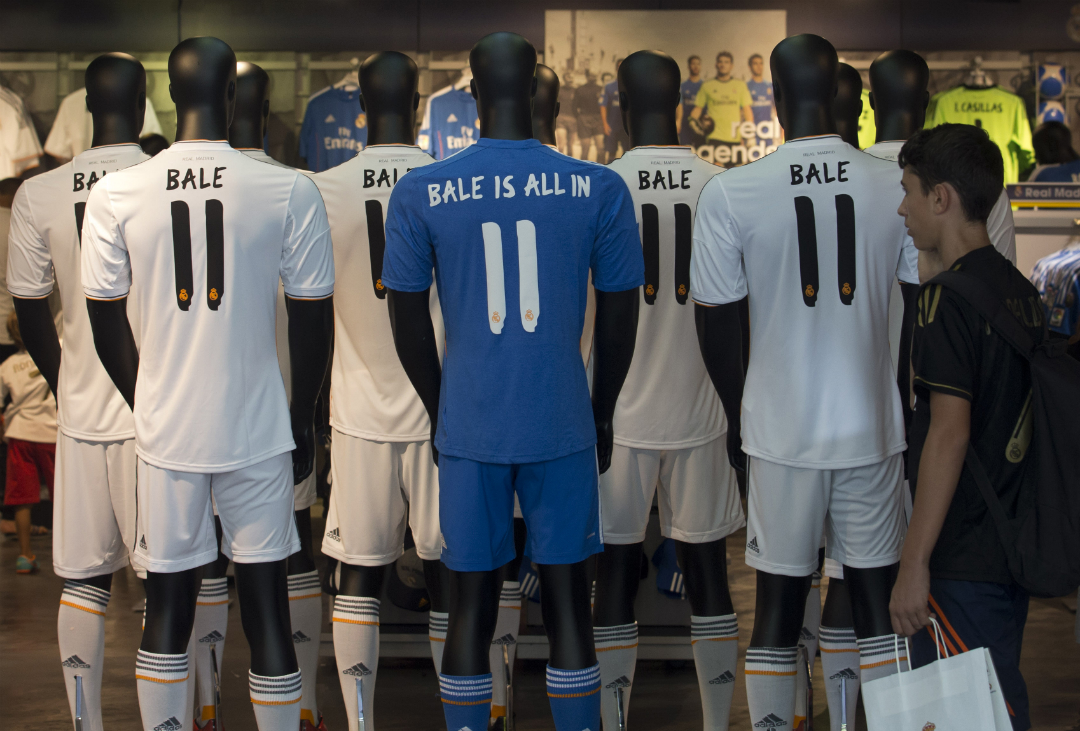
There is more; it's quite some operation. Someone has to call the hospital, to get them ready too. And the club’s TV channel. And the sound technicians and cameramen. And the translators. Once they would have sat alongside him; now they are hidden in a booth at the back of the room. Sometimes the player doesn’t want to use them: they have turned up ready to speak the local language but bottled it when they have seen the cameras; others have turned up with cheat notes smuggled under the desk.
But first, though, the player has to get there. The hotel is already booked, so it's time to charter the plane, ready to touch down at Torrejón, the military airport to the north-east of the city. Time too to dispatch the man to welcome him. In Madrid’s case, that means sending out Javier Coll: affable, discreet, tall. The former basketball player who speaks perfect English is the man the galácticos meet first, their chaperone. Their shadow.
Every club has one, or two, or three; they take the players flat-hunting and shopping and looking for schools. Sometimes the degree of help players demand is absurd. One liaison officer recalls getting a call when a light bulb went. At Madrid, Michael Owen complained of being literally in the dark, in a hotel room with his wife and young daughter, whose bed time was seven o’clock. If only he had said.
Usually clubs will do all they can to make them and their entourage comfortable, and the entourage can be huge. One English club signed a player from the old eastern bloc and had no translator and no liaison officer, so they called the local university to see if they had anyone of the same nationality: from student to superstar’s friend in five minutes. The player’s brother was soon playing five-a-side at the local sports centre – and that's still several steps short of the brothers conveniently signed by local clubs, or the family members found jobs.
Why clubs break the transfer record
It all starts with a big idea. Or a need. Or simply an opportunity. Joan Laporta admits that the promise to sign David Beckham which delivered him to presidential power in Barcelona in 2003 was vitally important. Not so much because it brought Beckham – it didn’t – but because it showed that this group of ambitious young men could deal with a club like Manchester United. With Beckham at Madrid, Ronaldinho was the second prize who became the dream catch.
According to one director at the club, when they made Zlatan Ibrahimovic the most expensive player in the world, the deal was driven as much by whom they got as whom they got rid of: Inter would happily take Samuel Eto’o off Barça's hands.
When Real Betis made Denílson the world’s most expensive player, president Manuel Lopera thought it the best way to make a statement: money no object. Fellow directors thought he was mad; it turns out they were right.
As for Madrid’s president Florentino Pérez, who executed the deal for Ronaldo that he inherited from Calderón, having previously made Luis Figo and Zinedine Zidane the most expensive players in the world, he likes to see himself as following the model laid down by Santiago Bernabéu. Bernabéu signed Ferenç Puskás, Paco Gento and Alfredo Di Stéfano. He was president for 40 years, the very embodiment of the club. Yet Pérez’s signings are even more easily explained.
Before he ran for president in 2000, Pérez carried out a survey among Madrid fans. The player they most wanted was Luis Figo, whose transfer price was fixed by a buy-out clause. Reaching an agreement with him sent Pérez into the presidency and Barcelona into crisis.
Zinedine Zidane became the Balón d’Or winner that year; Pérez saw him at a formal meal in Monte Carlo and famously passed a napkin down the table to him. On it, he had written “Do you want to play for Real Madrid?” Zidane passed it back: “Yes”. The following summer, Ronaldo was the star of the World Cup; in he came, too.
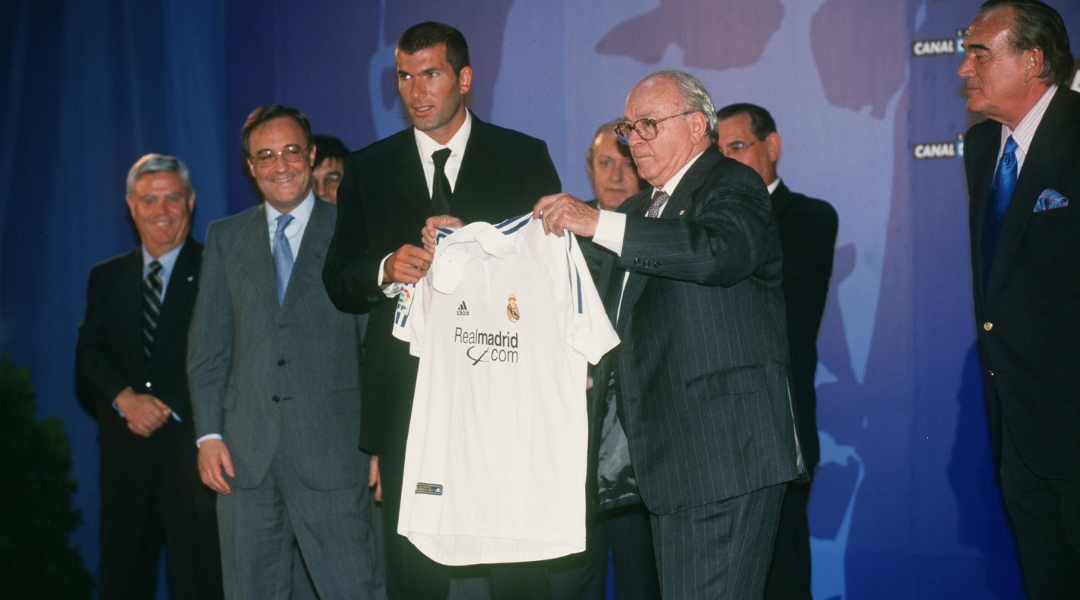
Like Bernabéu half a century earlier, Pérez aimed to buy the best player in the world each year. It hardly took in-depth scouting or an ability to spot a hidden gem: in marketing terms, Beckham was obvious. This summer, Pérez asked his sporting staff to prepare him a report on the players most likely to win the Balón d’Or in the future. Bale was among them, but just as important was the impact. The sheer size of the deal.
In 1962, Bernabéu signed Amancio Amaro for a world record fee; a year later he was warned that the club was bankrupt. Pérez argues that the opposite is true. “The most expensive players are the cheapest,” he has said. He once claimed that Brazilian Ronaldo “paid for himself”, and it is a claim that has been continued.
But Kaká cost Real Madrid over €140m and the football economist Professor Gay de Liebana insists that the self-financing claim is simply not true. “To recover the €100m spent on Bale," says Gay, "he would have to sell five million shirts.” Even if he did, a large proportion of those shirts would be sold to supporters who would have bought another Real Madrid player’s shirt in any case.
To recover the €100m spent on Bale, he would have to sell five million shirts”
Pérez got Madrid’s debt down to zero with the sale of the training ground soon after he joined the presidency. According to the club's official figures, the debt is back up to well over €100m; some sources peg it closer to €500m. When Pérez returned to the presidency in the summer of 2009, the club spent €295m on players; to see the Ronaldo deal through, a loan was taken out with two banks for over €150m.
What is true is that the biggest deals have an impact throughout the club; it's not just about what happens on the pitch. And that is something that is shared at other clubs too. One English insider puts it from a commercial perspective: “It is huge internally, because everyone within the club has something positive to talk to their customers and clients about. When we got news of our biggest signing we pushed the message out to all stakeholders and it was an opportunity – an excuse – for us to talk to everyone again: ticketing, membership, hospitality, sponsors. We’d go to them: ‘Did you know...?’”
Pérez was warned that €100m was too much for Bale, but he pressed on regardless. There is a model, but it's not a systematic one: just a conviction that, particularly after Madrid had missed out on Neymar, this was the right move. Far from concerning Pérez, the world record is a source of pride. This time there was just one problem: Cristiano Ronaldo. Hence the insistence that, despite Spurs’ protests to the contrary, the Welshman cost less than the Portuguese.
The price was ultimately set by Spurs – just as the price for Ronaldo was, as Calderón admits, set by Manchester United. “When that deal was done, the sensation was one of satisfaction,” the former president says. “We’d been chasing them for a while and Ronaldo had always told us he was grateful to United; we knew he wanted to play for Madrid but that we had to do it the right way with his club.
“But,” he adds, “once we had got the OK from the player, that was the moment we knew we’d got him. That’s when you call the people you work with and say ‘It’s on.’”
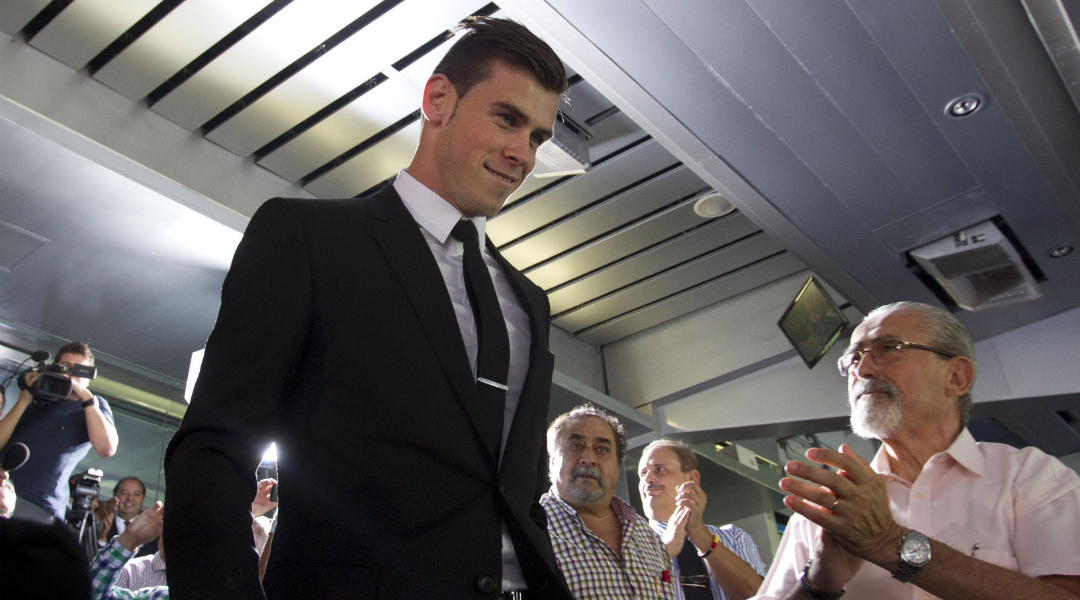
Negotiations can be bizarre. When Barcelona signed Hristo Stoichkov, he asked for a “red sports car”. Josep Maria Minguella likes to recall that during negotiations over Diego Maradona, the president of Argentinos Juniors pulled a gun from his belt and, without a word, put it on the table. One player and his client this summer staged a fake falling out in front of the buying club; the tactic worked and he eventually made his move. The lawyer who drew up the final contracts after a protracted world record deal says: “it was weeks; it felt like months.”
And then, at last, it goes through. “The excitement is incredible: I remember standing there before Zidane and I was like a kid. I’ve worked with footballers for years at Madrid but... it’s Zinedine Zidane!” The bell rings; everything has to be done perfectly.
Not that you control every single detail. On the first day of one player’s new life at a new club, he sat in the office at the stadium, filling out the final forms, when a member of staff came in. “Time for the presentation.” Up he got and followed them out the room, heading for the stands where he would be unveiled. An elderly man was in the corridor waiting. “Let me introduce you to our chaplain.”
The chaplain shook the players hand, noted the crucifix round his neck and said: “Ah, Catholic.”
The club’s new striker fixed him with look and replied: “Orthodox.”
